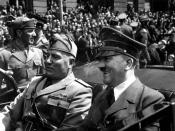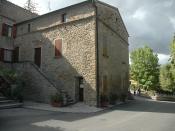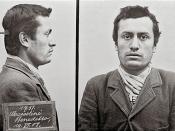The Great Depression After World War I, democratic governments often seemed too weak and indecisive to handle the problems of peacetime, especially the economic crisis of the Depression. Both Italy and Germany became dictatorships under men who promised strong leadership and simple cures for their nation's woes.
Britain had dominated Ireland since the 1100's. At Easter in 1916, British troops crushed a revolt in Dublin by Irish nationalists seeking independence. In 1918, the nationalists declared Ireland and independent state, and the Anglo-Irish treaty of 1921 recognized the independence of southern Ireland as the Irish Free State. The six mainly Protestant countries of Ulster remained part of the UK.
In 1924 Lenin died and Joseph Stalin succeeded him as head of the U. S. S. R. Stalin set out to strip farmers of their land in order to reorganize farming in larger state owned units called collective. His orders were brutally carried out by his army and the secret police.
Villages burned and their people killed. Millions were forcibly transported to labor camps in Siberia.
In Europe the sacrifices of war followed by economic suffering. These difficult times provided opportunities for both the German Nazi Party under Adolf Hitler, and Benito Mussolini's Italian Fascist Party. Both men came to power promising national recovery. Millions of their fellow citizens believed them. Soon both leaders were seeking territorial expansion in Europe.
In 1936, officers of the Spanish army led by General Franco rebelled against their government. The revolt swiftly became a civil war. Foreign states got involved. The fascist powers, Germany and Italy, sent out help to the army and it's right-wing supporters. Communist Russia aided the government. By 1939, most of Spain had been overrun by their leader General Franco was appointed head of state.
As world trade declined in the 1930s, millions were thrown out of work throughout the West. Banks collapsed, and people lost their savings. The unemployed rioted and everywhere lines for jobs lengthened. In the U. S., this human engineered calamity was made worst by a natural disaster. In 1934 and 1935, the Midwest was stricken by a severe drought. Intensive farming had exhausted the soil and, as the crops died, there was nothing to bind it together. Gales arose and blew the soil away. Thousands of farmers and their families were forced off the land, their livelihoods ruined.



![[Cave Hill. Belfast. County Antrim, Ireland] (LOC)](https://s.writework.com/uploads/1/13399/cave-hill-belfast-county-antrim-ireland-loc-thumb.jpg)
![[Royal Avenue, Belfast. County Antrim, Ireland] (LOC)](https://s.writework.com/uploads/1/13399/royal-avenue-belfast-county-antrim-ireland-loc-thumb.jpg)
